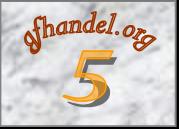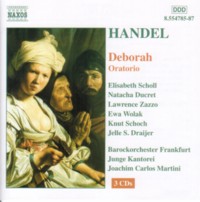Deborah
~HWV 51~
|
|
Deborah: Elisabeth Scholl Jael: Natacha Ducret Barak: Lawrence Zazzo Sisera: Ewa Wolak Canaanite Herald: Knut Schoch Abinoam / Priest: Jelle S. Draijer
Junge Kantorei
|
In the 1950s Winton Dean wrote “Deborah is a failure.” This short sentence has affected all subsequent analysis of the oratorio (including this review), but Dean’s extreme verdict is a valid criticism of the libretto by Samuel Humphreys. The libretto is chronic: its poetry is weak, it has almost no action apart from the arrival of the villain Sisera (the most interesting character who has too little to contribute and whose rather unsavory death occurs offstage), and the human characterization of the sanctimonious Israelites is weak. There is no “Let the Bright Seraphim” here to redeem them. It is also difficult to disagree with Dean’s condemnation that the libretto deals with “a political assassination of the basest kind”.
But of course Handel’s music is worth investigation, and Deborah has plenty of pleasing moments. Perhaps none are irrefutably great when considered in the grand scheme of things, but it is important to bear in mind that Deborah - Handel’s first new oratorio prepared especially for the London stage - was well liked by some of his most ardent supporters, such as Mrs. Delany. Some of its weaknesses are the side effects of its function as an early experiment, and without such failures Handel may not have developed oratorio into a form capable of giving birth to Belshazzar or Hercules (both considered “failures” during Handel’s lifetime, yet now rightly recognised as among his finest artistic achievements).
This new recording shall not transform anyone’s reservations about Naxos and their resident Handelian Joachim Carlos Martini. The usual problems with Martini’s performances are plain for all to hear: the choir struggle bravely with the English language, and this could be overlooked if they did not sound so clumsy and heavy. Good intentions abound more plentifully than good standards, and sadly this also applies to a few of the soloists. However, Elisabeth Scholl and Lawrence Zazzo acquit themselves well, and it is nice to have an alternative to Robert King’s superior yet slightly bland version on Hyperion. Although the Frankfurt Baroque Orchestra play their period instruments with a great deal of commitment, much of this performance is heavy handed and sounds sluggish (without this having anything to do with tempi, which are generally sensible. Misplaced organ continuo and dull treatment of ritornelli can be just as harmful).
Martini’s inclusion of many insertions from Handel’s later revivals is an astonishing decision. An attempt to perform an alternative version of Deborah would be welcome (it would be interesting to hear a 1744 version with Sisera’s role expanded and improved for the tenor John Beard), but including all the music - including those arias and recitatives Handel cut in order to make enough space for the insertions - makes for an unwieldy and untidy experience. Furthermore, the insertion of extra music that has no authentic context in any version of Deborah (such as the military music from Act III of Belshazzar) is foolhardiness beyond historical or artistic comprehension. Yet perhaps it is the inclusion of these extra insertions on this recording that justifies its addition to the discography (this is the first recording of the aria both “Cease O Judah”, a 1744 addition based on an aria composed for the 1735 revival of Athalia). If Martini’s conducting were more charismatic, and his choir and soloists more technically secure, then these recordings would be genuine bargains. It is true that musical imagination and sound quality does not have to be expensive, and there ought to be no reason why we cannot get the best of both possible worlds. But alas, on the strength of this offering, the old cynical adage that “you get what you pay for” remains as true as ever.
* previously released by the Junge Kantorei on their private recording
label
** Recorded at Kloster Eberbach (near Eltville/Rhein) on Whitsunday, May 23rd,
1999

© David Vickers - March 2002
